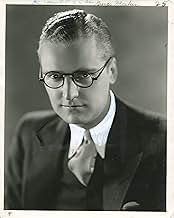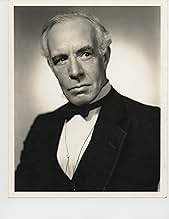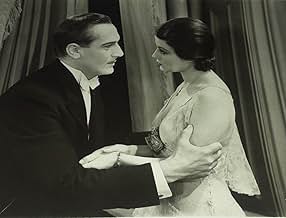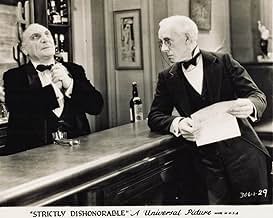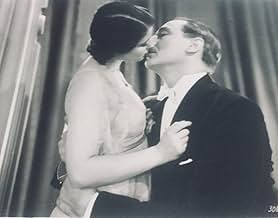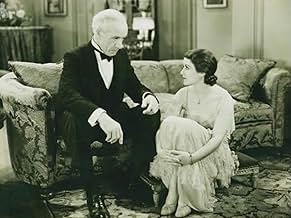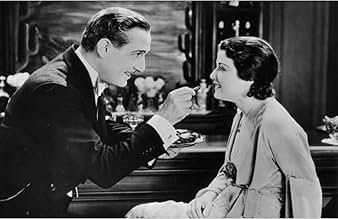Füge eine Handlung in deiner Sprache hinzuA womanizing singer falls for an old-fashioned Southern belle. The problem is, she already has a fiance.A womanizing singer falls for an old-fashioned Southern belle. The problem is, she already has a fiance.A womanizing singer falls for an old-fashioned Southern belle. The problem is, she already has a fiance.
- Auszeichnungen
- 3 wins total
Samuel Bonello
- Waiter
- (Nicht genannt)
Aldo Franchetti
- Arguing Customer
- (Nicht genannt)
Joseph W. Girard
- Officer
- (Nicht genannt)
Carlo Schipa
- Waiter
- (Nicht genannt)
Joe Torillo
- Cook
- (Nicht genannt)
Empfohlene Bewertungen
After a long period of neglect Preston Sturges is now firmly enshrined in the ranks of the great filmmakers of Hollywood's golden age, celebrated by fans as a first rate director and a screenwriter of genius. His claim to fame as a great playwright remains obscure, however: from 1929 to 1932 Sturges had five plays produced on Broadway, and while two were moderately successful two more were outright flops. Only one of these works was an unqualified success, but that play-his second, a comedy called "Strictly Dishonorable"- happened to be one of the biggest smash hits of the era. Sturges seldom did anything halfway! And because this hit coincided with the birth of the talkies, it was only natural that the major studios would vie for the playwright's services as a screenwriter, and produce an adaptation. Universal Pictures won the competition and duly produced the movie. And yet, despite the renewed attention Sturges has received in recent years, the film version of his biggest stage hit seems to be in limbo, seldom screened at revival houses and, at this writing, not available in an official video or DVD release. That's a pity, for while it lacks the dizzy, iconoclastic spirit Sturges the director would bring to his screenplays of the '40s, the movie version of Strictly Dishonorable is an interesting and unusual introduction to this uniquely gifted artist.
Directed by John M. Stahl, Strictly Dishonorable is, first and foremost, a filmed play, and that's both a plus and a minus. On the plus side, Sturges' script was used almost verbatim with only a handful of cuts and minor changes, so the movie serves as a decent archival record of the show. On the other hand, because the actors recite their dialog without the benefit of a live audience (i.e. laughter) this sort of film-making can sometimes result in a kind of mummified artifact, neither live theater nor lively cinema. In this case, fortunately, the acting and the offbeat quality of the story hold viewer interest, and although it remains stage-bound this movie is more enjoyable than many other early talkies. Happily, in 1931 the filmmakers were still unencumbered by the dread Production Code, so we get not only most of the original dialog but a provocative theme, one that would never have gotten a green light from the Breen Office a few years later.
The story revolves around a young Southern belle named Isabelle Perry (played by the ill-fated Sidney Fox). Isabelle has come to New York with her unpleasant fiancée Henry, who clearly expects to control her life in every respect once they're married and safely ensconced with his family in West Orange, New Jersey. First, however, they share an unhappy night on the town in Manhattan and wind up in an atmospheric speakeasy. Here they meet a hard-drinking retired judge (Lewis Stone) whose philosophical quips perk things along, and a famous Italian opera star (Paul Lukas) known professionally as Tino Carrafa, who modestly insists on being called "Gus." Gus is an old friend of the speakeasy's proprietor, and he keeps an apartment upstairs. He's also a notorious Casanova. When Gus shows Isabelle a little too much attention her fiancée loses his temper, makes an ugly scene, and gets thrown out. However, Isabelle stays. In fact, she spends the night in Gus' room upstairs, in a pair of borrowed pajamas. The two of them have fallen in love at first sight, but now the central question becomes: will the chaste Isabelle sleep with the guy, or not? And when Henry returns in the morning, who will she choose?
A plot that hinges on a woman choosing whether or not to retain her virginity startled Broadway audiences in 1929, and surely sparked the play's great success. This is more than just a routine sex farce, however. Sturges' gift for strong characterization and witty dialog are already present. It's surprising, even now, to hear Isabelle wonder aloud why men make such a fuss about her virginity, "as if it mattered to anybody but me." Sturges' play script was re-published in the 1980s in an anthology, and when I re-read it after seeing the film I found that only a handful of lines were deleted. One significant change, however, was that while the Judge Dempsey of the play was still professionally active, the film's Dempsey is retired; apparently, the filmmakers didn't want to suggest that any working judge spends so much time hanging out drinking in speakeasies. There's also an amusing inside joke here for movie buffs, because Lewis Stone went on to cinematic immortality as MGM's wise, eminently sober Judge Hardy!
I was fortunate enough to see this rarity at NYC's Film Forum with an appreciative crowd. Stone was decidedly the audience favorite. I confess I had mixed feelings about Sidney Fox's performance during the first couple of scenes, but gradually warmed up to her. Initially her Southern accent struck me as exaggerated, but after a while it seemed like a key component of Isabelle's strategic arsenal; that is, she comes off like the kind of Southern belle who deliberately emphasizes her accent for effect. (I've known people like that.) And by the end of the movie Fox's Isabelle felt like a deft, fully rounded characterization. I was sorry to learn afterward that the film career of this attractive actress was so brief, and sorrier still to discover that her life ended tragically. The only movies she appeared in that get any attention nowadays are the ones that also feature actors who went on to bigger things: Bette Davis, Humphrey Bogart, Bela Lugosi, etc. Sidney Fox deserves better, and so does Strictly Dishonorable. There are plenty of buffs, most especially fans of Preston Sturges, who would welcome this film's re-emergence from the studio vaults.
Directed by John M. Stahl, Strictly Dishonorable is, first and foremost, a filmed play, and that's both a plus and a minus. On the plus side, Sturges' script was used almost verbatim with only a handful of cuts and minor changes, so the movie serves as a decent archival record of the show. On the other hand, because the actors recite their dialog without the benefit of a live audience (i.e. laughter) this sort of film-making can sometimes result in a kind of mummified artifact, neither live theater nor lively cinema. In this case, fortunately, the acting and the offbeat quality of the story hold viewer interest, and although it remains stage-bound this movie is more enjoyable than many other early talkies. Happily, in 1931 the filmmakers were still unencumbered by the dread Production Code, so we get not only most of the original dialog but a provocative theme, one that would never have gotten a green light from the Breen Office a few years later.
The story revolves around a young Southern belle named Isabelle Perry (played by the ill-fated Sidney Fox). Isabelle has come to New York with her unpleasant fiancée Henry, who clearly expects to control her life in every respect once they're married and safely ensconced with his family in West Orange, New Jersey. First, however, they share an unhappy night on the town in Manhattan and wind up in an atmospheric speakeasy. Here they meet a hard-drinking retired judge (Lewis Stone) whose philosophical quips perk things along, and a famous Italian opera star (Paul Lukas) known professionally as Tino Carrafa, who modestly insists on being called "Gus." Gus is an old friend of the speakeasy's proprietor, and he keeps an apartment upstairs. He's also a notorious Casanova. When Gus shows Isabelle a little too much attention her fiancée loses his temper, makes an ugly scene, and gets thrown out. However, Isabelle stays. In fact, she spends the night in Gus' room upstairs, in a pair of borrowed pajamas. The two of them have fallen in love at first sight, but now the central question becomes: will the chaste Isabelle sleep with the guy, or not? And when Henry returns in the morning, who will she choose?
A plot that hinges on a woman choosing whether or not to retain her virginity startled Broadway audiences in 1929, and surely sparked the play's great success. This is more than just a routine sex farce, however. Sturges' gift for strong characterization and witty dialog are already present. It's surprising, even now, to hear Isabelle wonder aloud why men make such a fuss about her virginity, "as if it mattered to anybody but me." Sturges' play script was re-published in the 1980s in an anthology, and when I re-read it after seeing the film I found that only a handful of lines were deleted. One significant change, however, was that while the Judge Dempsey of the play was still professionally active, the film's Dempsey is retired; apparently, the filmmakers didn't want to suggest that any working judge spends so much time hanging out drinking in speakeasies. There's also an amusing inside joke here for movie buffs, because Lewis Stone went on to cinematic immortality as MGM's wise, eminently sober Judge Hardy!
I was fortunate enough to see this rarity at NYC's Film Forum with an appreciative crowd. Stone was decidedly the audience favorite. I confess I had mixed feelings about Sidney Fox's performance during the first couple of scenes, but gradually warmed up to her. Initially her Southern accent struck me as exaggerated, but after a while it seemed like a key component of Isabelle's strategic arsenal; that is, she comes off like the kind of Southern belle who deliberately emphasizes her accent for effect. (I've known people like that.) And by the end of the movie Fox's Isabelle felt like a deft, fully rounded characterization. I was sorry to learn afterward that the film career of this attractive actress was so brief, and sorrier still to discover that her life ended tragically. The only movies she appeared in that get any attention nowadays are the ones that also feature actors who went on to bigger things: Bette Davis, Humphrey Bogart, Bela Lugosi, etc. Sidney Fox deserves better, and so does Strictly Dishonorable. There are plenty of buffs, most especially fans of Preston Sturges, who would welcome this film's re-emergence from the studio vaults.
Preston Sturges' hit sex comedy of 1929 was filmed by Universal almost entirely intact, with an A cast and direction by the proficient but apparently not-very-nice John Stahl. It poses the question, will Southern belle Isabelle (Sidney Fox, who's charming) opt for life in West Orange with her obnoxious fiancé (George Meeker, quite good), or will she succumb to the ministrations of handsome Lothario opera singer Gus (Paul Lukas, perfect casting)? It's a situation not unlike "The Moon Is Blue," so scandalously filmed some 20 years later, and its frankness about virginity and conventional morality is refreshing. There's also Lewis Stone as a tippling judge, livelier than he often was at MGM, and Sidney Toler, almost unrecognizably handsome as an Irish cop. You have to accept the prejudices and skewed morality of the time--there's casually racist chatter, and drunkenness in and of itself is supposed to be hilarious--but it's a delightful artifact. And while Sturges' incomparable gift for dialog isn't in full flower yet, you can see the genius he's going to become.
Early film musicals kept the Broadway viewpoint, shooting all the their musical numbers under the proscenium arch. Just a few years later they looked old fashioned. Strictly Dishonorable shows the same problem with shooting a play exactly as seen on Broadway. It dismisses almost entirely with the opportunities of the camera. Lighting is flat, camera movement minimized, and closeups almost non existent. For a wordy play, where almost nothing physical happens, this is death. Cinematographer Karl Freund must have gone home every night in tears. It is slooooooooow. The few witty lines are swallowed up by the inane.
I thought the entire cast, with the exception of the bit players, miscast. Sydney Fox, in particular, didn't have the chops for such a large and varying role. Paul Lucas didn't seem to me sleazy enough to be a rue'. Lewis Stone couldn't carry off a drunk. And Sydney Toler as an Irish cop?
I found the constant changes in attitude of the principals to unbelievable. Fox's coquettishness, like her accent, came and went.
Now, I must say, although I love pre-code films, there are some I do not burn to disk. This would have been one of them. However, my wife, who hates these films, saw it as a teenager, insisting on watching it in its entirety. I stayed for about an hour of it, before leaving out of complete boredom. I think this was sentimentality on her part, just like my watching The Phantom Empire serial several times a year, even though I know it's pretty bad.. So, at her request, I'm burning this one while holding my nose.
I thought the entire cast, with the exception of the bit players, miscast. Sydney Fox, in particular, didn't have the chops for such a large and varying role. Paul Lucas didn't seem to me sleazy enough to be a rue'. Lewis Stone couldn't carry off a drunk. And Sydney Toler as an Irish cop?
I found the constant changes in attitude of the principals to unbelievable. Fox's coquettishness, like her accent, came and went.
Now, I must say, although I love pre-code films, there are some I do not burn to disk. This would have been one of them. However, my wife, who hates these films, saw it as a teenager, insisting on watching it in its entirety. I stayed for about an hour of it, before leaving out of complete boredom. I think this was sentimentality on her part, just like my watching The Phantom Empire serial several times a year, even though I know it's pretty bad.. So, at her request, I'm burning this one while holding my nose.
There is no need to go on and on about this film. The plot is pretty simple and I don't even want to spoil that. Trust me in saying the film is funny, has great characters, and both Fox and Lukas work well together.
I do not know Sidney Fox's career but after seeing this, I look forward to more viewings of her. She has a Southern accent in this film, and I am not sure if it is for the part, or that was just her. Unfortunately she only had a career from 1931 to 1935. She deserved more recognition.
The story moves smoothly. You will recognize Lewis Stone, who later was known as "Judge Hardy". He plays a judge in this film too.
I found myself laughing out loud at certain situations and lines. Lewis Stone is called a "barfly" in one scene and his reaction to this characterization is hilarious. They just don't make "fun" movies like this any more.
Check it out. It is a piece of fun fluff but it is still a Classy Classic to be enjoyed.
I do not know Sidney Fox's career but after seeing this, I look forward to more viewings of her. She has a Southern accent in this film, and I am not sure if it is for the part, or that was just her. Unfortunately she only had a career from 1931 to 1935. She deserved more recognition.
The story moves smoothly. You will recognize Lewis Stone, who later was known as "Judge Hardy". He plays a judge in this film too.
I found myself laughing out loud at certain situations and lines. Lewis Stone is called a "barfly" in one scene and his reaction to this characterization is hilarious. They just don't make "fun" movies like this any more.
Check it out. It is a piece of fun fluff but it is still a Classy Classic to be enjoyed.
Although co-written by Preston Sturges this one seems to have a bit of the Lubitsch touch in it and it's quite odd considering it's a Laemmle era Universal film. Isabel (Sidney Fox) and Henry (George Meeker) are an engaged couple. Isabel is a Southerner, Henry hails from New Jersey. Besides the country mouse/city mouse differences between them, Henry is completely unlikeable and thinks the worst of everyone. Apparently he was nice to Isabel until the engagement ring went on and then he changed. When asked about it he tells her "well you didn't expect me to stay all sappy forever did you?" He tells Isabel to stop thinking and leave her happiness to him, is very disrespectful of her, and is always trying to pick a fight with someone.
They stop in for a drink at a speakeasy full of characters, and here is where the trouble starts. When Henry goes outside of the bar to deal with his illegally parked car, Isabel makes the acquaintance of the dashing opera singer Count Gus Di Ruvo (Paul Lukas), and it is lust at first sight. George returns, makes some insulting remarks and then demands to Isabel, she calls off the engagement, and Henry storms out. Isabel and the Count take the opportunity to go off to the Count's apartment upstairs. Incredulous that Isabel would ever do anything on her own, Henry enlists the help of the police to round up the scoundrels who must have kidnapped her.
Now Isabel knows the Count's intentions are "strictly dishonorable" - he's quite upfront about his lady's man status - yet she's considering sleeping with him. When the Count discovers Isabel is a virgin, his demeanor changes completely. Back in the days of chivalry, most guys - honorable ones - don't mind being a casual second but are queasy about being a casual "first". He tramps upstairs to sleep at the judge's apartment. The Count acts quite horrid to Isabel, and you can't tell if it is because he is awestruck or horrified because he has finally almost gotten involved with an actual virgin.
This leaves Isabel in quite a fix. She's already said she can't go back to Mississippi because of the gossip it would cause, Henry has gotten on her last nerve even if he should choose to return, and now the Count has run out on her. How will all of this work out? Watch and find out.
For some reason MGM loaned Lewis Stone out to Universal to play the part of a drunken judge who tries to prevent Isabel from taking a false step by staging all kinds of interruptions for the couple, and in the process he almost steals the show. An odd but amusing turn for an actor who ten years later will be known far and wide as the sober Judge Hardy of the Andy Hardy films. Sidney Toler, who later plays Charlie Chan, here plays an Irish cop who has no problem with the speakeasy that the cast is patronizing, and in fact seems pretty friendly with all concerned.
This film is a bit stagy and static, which is understandable given that it is based on a play, but it is worth sticking with it for the witty dialogue and the rather clever although partially expected denouement. A very worthy early talkie with a fine cast.
They stop in for a drink at a speakeasy full of characters, and here is where the trouble starts. When Henry goes outside of the bar to deal with his illegally parked car, Isabel makes the acquaintance of the dashing opera singer Count Gus Di Ruvo (Paul Lukas), and it is lust at first sight. George returns, makes some insulting remarks and then demands to Isabel, she calls off the engagement, and Henry storms out. Isabel and the Count take the opportunity to go off to the Count's apartment upstairs. Incredulous that Isabel would ever do anything on her own, Henry enlists the help of the police to round up the scoundrels who must have kidnapped her.
Now Isabel knows the Count's intentions are "strictly dishonorable" - he's quite upfront about his lady's man status - yet she's considering sleeping with him. When the Count discovers Isabel is a virgin, his demeanor changes completely. Back in the days of chivalry, most guys - honorable ones - don't mind being a casual second but are queasy about being a casual "first". He tramps upstairs to sleep at the judge's apartment. The Count acts quite horrid to Isabel, and you can't tell if it is because he is awestruck or horrified because he has finally almost gotten involved with an actual virgin.
This leaves Isabel in quite a fix. She's already said she can't go back to Mississippi because of the gossip it would cause, Henry has gotten on her last nerve even if he should choose to return, and now the Count has run out on her. How will all of this work out? Watch and find out.
For some reason MGM loaned Lewis Stone out to Universal to play the part of a drunken judge who tries to prevent Isabel from taking a false step by staging all kinds of interruptions for the couple, and in the process he almost steals the show. An odd but amusing turn for an actor who ten years later will be known far and wide as the sober Judge Hardy of the Andy Hardy films. Sidney Toler, who later plays Charlie Chan, here plays an Irish cop who has no problem with the speakeasy that the cast is patronizing, and in fact seems pretty friendly with all concerned.
This film is a bit stagy and static, which is understandable given that it is based on a play, but it is worth sticking with it for the witty dialogue and the rather clever although partially expected denouement. A very worthy early talkie with a fine cast.
Wusstest du schon
- WissenswertesThe play opened in New York City, New York, USA at the Avon Theater on 18 September 1929 and ran for 557 performances. William Ricciardi originated his role in the play, and Louis Jean Heydt was also in the cast.
- VerbindungenReferenced in American Grindhouse (2010)
Top-Auswahl
Melde dich zum Bewerten an und greife auf die Watchlist für personalisierte Empfehlungen zu.
Details
- Erscheinungsdatum
- Herkunftsland
- Sprachen
- Auch bekannt als
- När oskulden sover...
- Drehorte
- Produktionsfirma
- Weitere beteiligte Unternehmen bei IMDbPro anzeigen
- Laufzeit1 Stunde 31 Minuten
- Farbe
Zu dieser Seite beitragen
Bearbeitung vorschlagen oder fehlenden Inhalt hinzufügen

Oberste Lücke
By what name was Strictly Dishonorable (1931) officially released in Canada in English?
Antwort
